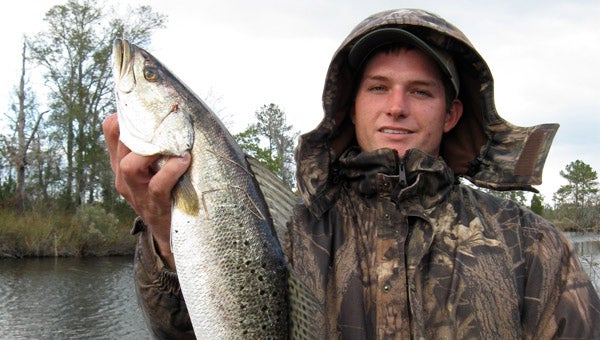Record Breaking Cold Hasn’t Caused Fish Kill—YET
Published 11:24 am Tuesday, January 14, 2014

GONE FISHING: Aurora resident Beau Brothers holds a very nice speckled trout taken during a January cold spell. (FRED BONNER | CONTRIBUTED)
By Fred Bonner
Contributor
Saltwater fishermen all along North Carolina’s coast are holding their breaths, waiting to see if this record-breaking cold wave we’ve been experiencing is killing speckled trout and redfish.
Cold weather and the subsequent icing over many of our coastal streams is a well-known cause of major fish kills, especially our valued speckled trout. These southern fish simply can’t take sustained cold weather that results in a skim of ice across brackish water creeks. Other noted coastal estuarine fish, such as our North Carolina state fish, the red drum (otherwise known as redfish), are also affected by unseasonably cold weather.
Although speckled trout have been showing up in record numbers as far north as Chesapeake Bay, the speckled trout is generally considered to be a “southern fish.” They do not take kindly to cold water.
For the past few years our North Carolina coastal waters have been blessed with very little cold weather. The last major fish kill in Washington occurred in 2010 when speckled trout were reported to be dead and/or dying by the thousands in many of our shallow coastal creeks. For a few years, fishermen held their breaths, hoping that perhaps a few of the trout had survived to spawn and bring the numbers of speckled trout back to the high levels we’d come to love. Since the big kill-off of 2010, we’ve watched the numbers and size of our speckled trout reach levels that have brought fishermen flocking to the coast.
Many of us old timers remember the devastating fish kills from the 1950s and 60s. When the word leaked out that many of our creeks were “bank to bank” with dead or dying trout, everybody that could grabbed a dipnet and either walked along the shore, or, if they had access to a boat, paddled along the creeks and picked up trout by the boat load. What we couldn’t use ourselves we passed on to others in need of fresh seafood. There were no limits in those days and we saw no need to let these fish spoil in the creeks.
Some local fishermen knew that it was the extended cold that killed the trout. If a large amount of snow ever accompanied the cold weather, people felt that something in the run-off from the meting snow caused the trout (and red drum) to die.
Fishery scientists, as well as experienced speckled trout fishermen, tell us that the early winter is one of the best times to catch these trout, well up into the headwaters of our coastal streams. The fish have ventured up into these shallow waters in search of forage fish, such as menhadenthat are also found in these protected waters.
When the winter’s cold happens gradually over an extended period of time, these predators sense the danger from the cooling water and retreat to the deeper and warmer waters further out. With any kind of luck, most of these fish will survive in our marginally southern waters.
On the other hand, if a bitter cold wave hits our area suddenly, freezing the creeks over, the fish don’t have time to retreat to the deeper waters and are either stunned or die in great numbers in the shallow creeks. If the waters can warm-up and the ice melts in short order, some of these fish that were merely stunned may survive.
Winterkill survivors mean speckled trout for the future. It’s because of this that the N.C. Division of Marine Fisheries regulates the fishing of speckled trout. Even though it may seem like a waste of good fresh seafood, people who pick up some of the affected trout are not allowed to keep over the listed daily creel limit of speckled trout.
As of last Thursday (Jan. 9), Patricia Smith with the N.C. Division of Marine Fisheries contacted all of the coastal Marine Fisheries Enforcement sections to see if any of their field personnel had reported any speckled trout (or other fish) kills in their respective areas. None were reported.
With the weather nearing spring-like temperatures for the week of Jan. 12, it looks like our speckled trout have dodged another bullet as far as winterkill goes. As a matter of a fact, a quick unseasonably warm break in the winter weather, as they’re forecasting, can mean that the trout may go into a feeding frenzy. If we can just make it through this winter without any major, long lasting cold spells, the survival rate for the speckled trout looks good. This year’s trout fishing outlook overall is darned good.





